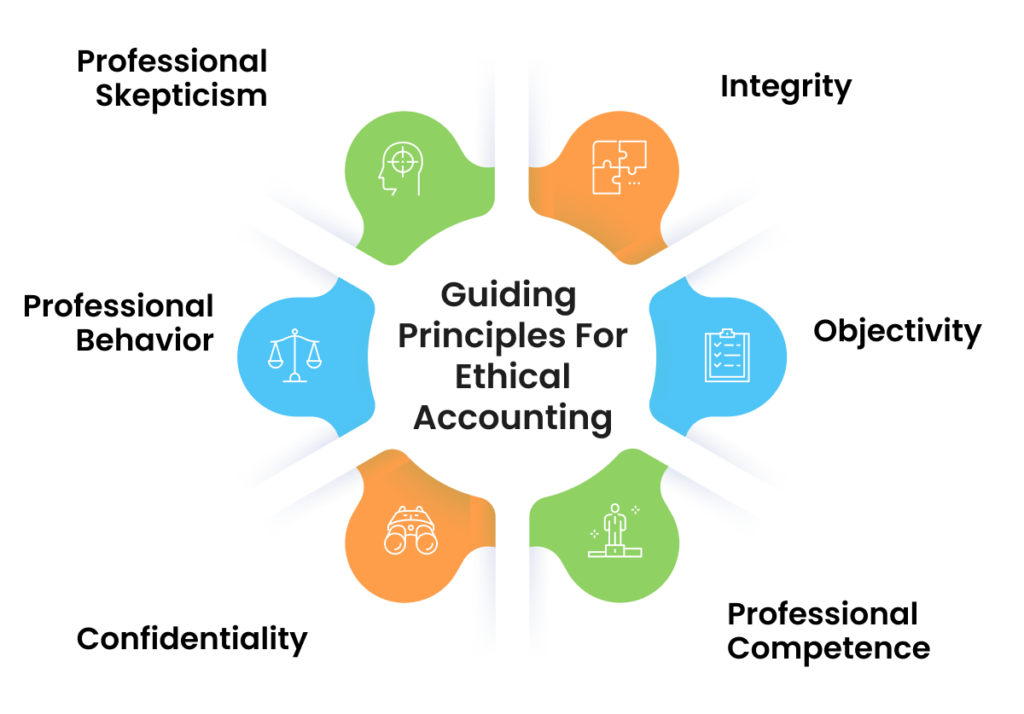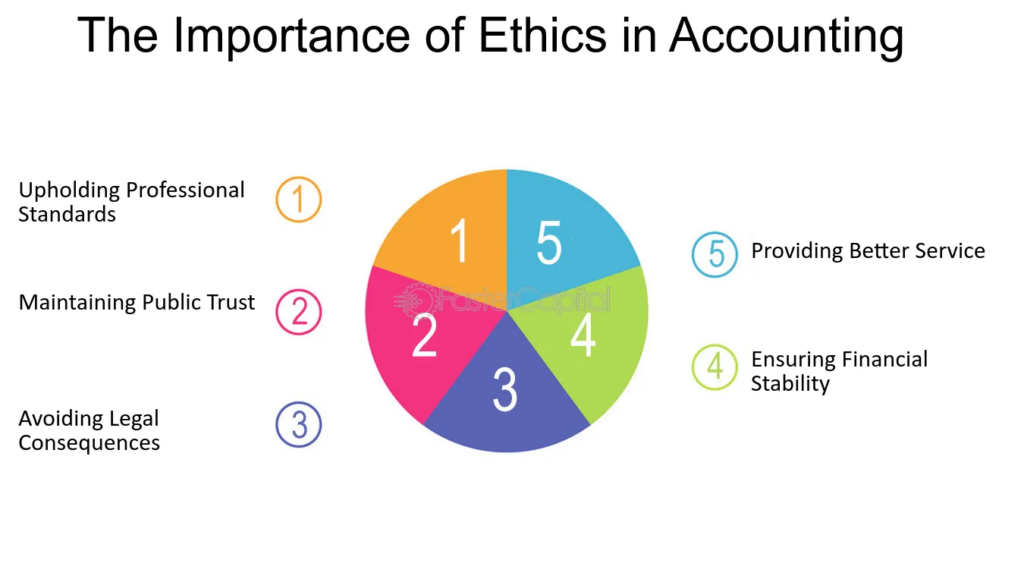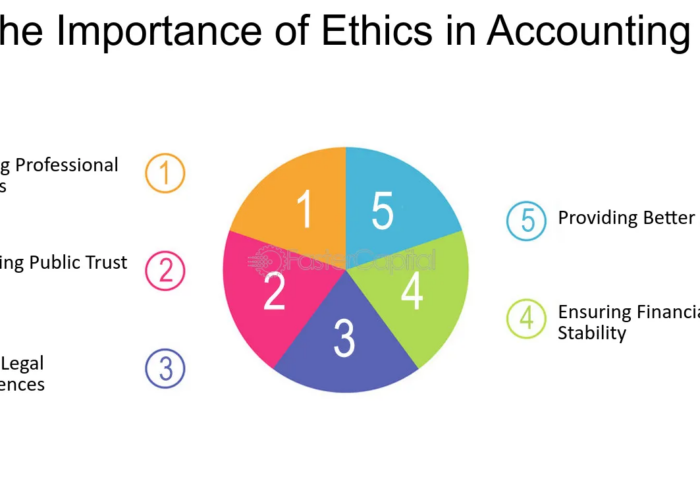Have you ever felt that pang of unease over the accuracy of your company’s financial records following an unexpected event? Believe me, I’ve shared in that anxiety – it’s no small cause for concern when we learn employee theft contributes to 33 percent of business bankruptcies.
Fortunately, this article comes as a beacon amidst these murky waters of accounting ethics. Brace yourself for invaluable insights designed to fortify honesty and ensure transparency.
Key Takeaways
- Ethics in accounting is crucial for building trust with investors, maintaining professional integrity, avoiding legal trouble, and protecting the reputation of the profession.
- Accountants must comply with laws and regulations to ensure ethical behavior in accounting, which includes following legal guidelines, avoiding fraudulent activities, protecting stakeholders’ interests, mitigating legal risks, and promoting transparency.
- Honesty and integrity in decision-making are essential aspects of ethical behavior in accounting as they uphold high moral standards and build trust with clients and stakeholders.
- Diligence in financial matters is necessary for ethical behavior in accounting to ensure accurate financial reporting, compliance with laws and regulations, transparency, accountability, and protection of stakeholders’ interests.
The Importance of Ethics in Accounting
Maintaining ethical standards in accounting is crucial as it builds trust with investors, upholds professional integrity, avoids legal trouble, and protects the reputation of the accounting profession.
Building trust with investors
Building trust with investors is a pivotal role of ethical conduct in accounting. It goes beyond just reporting accurate numbers – it encompasses the entire process of financial management and decision-making.
By demonstrating honesty and integrity, accountants reassure investors about the company’s financial health. This transparency gives investors confidence to make informed decisions on investing in a company, knowing that its books aren’t cooked or manipulated.
Breaches of ethics may lead to mistrust, triggering withdrawal of investment or legal action against a firm, thus emphasizing even more on the importance of maintaining high ethical standards in accounting practices.
Maintaining professional standards
Maintaining professional standards in accounting is paramount. It not only creates a positive image for the accountant but also instills confidence in clients and stakeholders. Upholding these standards involves being honest, diligent, and transparent in all financial dealings.
Meeting this bar requires accountants to comply with laws, regulations and ethical codes established by various accounting bodies.
Integrity acts as the heart of these standards. Every business interaction demands straightforwardness from professionals in the accounting industry. The necessity for confidentiality remains uncompromised while handling sensitive data.
These aspects of professionalism ensure that trustworthiness permeates financial reporting processes, shielding investors’ interests by providing accurate information about their investments.
Avoiding legal trouble
Ethics plays a significant role in accounting, especially when it comes to sidestepping legal headaches. Unethical behavior can result in severe consequences such as fines or even imprisonment.
On the other hand, complying with laws and regulations is synonymous with safeguarding your professional reputation and maintaining credibility in the eyes of clients and stakeholders.
You see, trustworthiness in financial accounting not only mitigates risks but also fosters transparency and accountability. Therefore, practicing diligence and adherence to ethical principles are proactive steps towards avoiding legal trouble.

Protecting the reputation of the accounting profession
Protecting the reputation of the accounting profession is vital for maintaining public trust and confidence in financial reporting. Ethical behavior plays a crucial role in safeguarding this reputation, as it ensures that accountants act with honesty, integrity, and trustworthiness.
By adhering to ethical principles, accountants demonstrate their commitment to delivering accurate and reliable financial information. This not only helps build investor trust but also enhances the credibility of the entire accounting industry.
By upholding high standards of professionalism and ethics, accountants can contribute to creating a positive image for the profession and inspire confidence in their clients and stakeholders.
In today’s complex business landscape, where transparency and accountability are paramount, protecting the reputation of the accounting profession is more important than ever before.
Accountants must prioritize ethical conduct by following established guidelines set forth by professional bodies to prevent any misuse or mishandling of financial information. By doing so, they can maintain client confidentiality while ensuring that all financial transactions are conducted honestly and transparently.
Guidelines for Ethical Behavior in Accounting
Compliance with laws and regulations is crucial in ensuring ethical behavior in accounting. It sets the foundation for honesty, integrity, and diligent financial practices. Read on to discover more about the importance of ethical guidelines in the accounting profession.
Compliance with laws and regulations
Compliance with laws and regulations is a fundamental aspect of ethical behavior in accounting. As an accountant, I understand the importance of adhering to legal requirements to ensure the integrity and accuracy of financial reporting. Here are some key points to consider:
- Following laws and regulations: Adhering to relevant laws and regulations is crucial for accountants to maintain ethical standards. It ensures that financial information is prepared and presented in accordance with legal guidelines.
- Avoiding fraudulent activities: Compliance with laws helps prevent fraudulent activities such as embezzlement, misappropriation of funds, or illegal tax evasion. By following these rules, accountants safeguard the interests of their clients and businesses.
- Protecting stakeholders’ interests: By complying with laws and regulations, accountants protect the interests of stakeholders such as investors, creditors, and employees. They provide accurate and reliable financial information that enables stakeholders to make informed decisions.
- Mitigating legal risks: Compliance reduces the risk of legal repercussions for both accountants and their clients. By staying updated on accounting laws, rules, and regulations, accountants can avoid penalties, lawsuits, or damage to their professional reputation.
- Ensuring transparency: Compliance with laws promotes transparency in financial reporting. It ensures that financial statements reflect the true and fair position of a business by following standardized accounting principles.
Honesty and integrity in decision-making
Maintaining honesty and integrity in decision-making is a fundamental aspect of ethical behavior in accounting. As an accountant, it is essential to make choices that prioritize the truth and uphold high moral standards.
By acting honestly and with integrity, accountants can ensure that financial information is accurately recorded, reported, and communicated. This commitment to ethical decision-making builds trust with clients, investors, and stakeholders who rely on accurate financial data to make informed business decisions.
Upholding honesty and integrity in decision-making also helps protect companies from legal trouble and upholds the reputation of the accounting profession as a whole.
Diligence in financial matters
Maintaining diligence in financial matters is a crucial aspect of ethical behavior in accounting. It requires accountants to be thorough, attentive, and accurate when handling financial transactions and records.
By demonstrating diligence, accountants ensure that all financial information is properly recorded, analyzed, and reported in compliance with laws and regulations. This helps to minimize errors or misrepresentations that could potentially lead to legal trouble or damage the reputation of both the accountant and the accounting profession as a whole.
Diligence also plays a significant role in protecting stakeholders’ interests by ensuring transparency and accountability in financial reporting.
The Consequences of Poor Ethics in Accounting
Poor ethics in accounting can have serious consequences, including financial losses for companies, damage to reputation and relationships, and the risk of legal repercussions.
Company financial losses
Company financial losses can have serious consequences for any organization. When accounting ethics are compromised, it can lead to inaccurate financial reporting and mismanagement of funds.
This can result in significant monetary losses for the company, impacting its profitability and sustainability. Ethical accountants play a vital role in preventing such losses by ensuring transparent and accurate financial reporting practices.
By adhering to ethical standards and diligently handling financial matters, accountants help protect companies from potential financial setbacks caused by unethical behavior or fraudulent practices.
Maintaining integrity in accounting is crucial to safeguard an organization’s finances and prevent unnecessary loss. Ethical accountants prioritize honest decision-making, compliance with laws and regulations, and diligent oversight of all financial transactions.
Their commitment to upholding ethical principles helps mitigate the risk of financial losses that may arise from unethical practices or misconduct within the accounting profession.
Damage to reputation and relationships
Poor ethics in accounting can result in severe damage to a company’s reputation and relationships. When unethical practices are discovered, customers, investors, and business partners may lose trust and confidence in the organization.
This erosion of trust can lead to financial losses as customers take their business elsewhere and investors withdraw their support. Moreover, damaged relationships with clients and stakeholders can be challenging to repair, potentially impacting future opportunities for growth and collaboration.
It is crucial for accountants to understand the consequences of poor ethics and prioritize ethical behavior to protect both their own reputation and the reputation of the accounting profession as a whole.
Risk of legal repercussions
Engaging in unethical behavior in accounting can result in serious legal consequences. Accountants who fail to adhere to ethical standards may face legal action, fines, or even imprisonment.
In addition, the reputation of the accounting profession as a whole can be tarnished when unethical practices come to light. Clients and stakeholders may lose trust in accountants and become hesitant to engage their services.
To protect themselves and their clients from these risks, accountants must prioritize ethics by following laws and regulations, maintaining honesty and integrity in decision-making, and diligently handling financial matters.
5 Key Reasons Why Ethics is Important in Accounting
Ethics is crucial in accounting for handling sensitive information, taking responsibility for mistakes, upholding a professional image, reducing legal risks, and fulfilling obligations to clients and businesses.
Handling sensitive information
As an ethical accountant, it is my responsibility to handle sensitive information with the utmost care and confidentiality. This includes safeguarding financial records, personal data, and other confidential information entrusted to me by clients.
By maintaining strict privacy protocols and security measures, I can ensure that this sensitive information remains protected from unauthorized access or misuse. Adhering to ethical principles in handling sensitive information not only demonstrates professionalism but also helps build trust with clients who rely on me to keep their financial matters secure.
In addition, handling sensitive information ethically is crucial for complying with legal requirements and industry regulations. Laws such as the General Data Protection Regulation (GDPR) place significant emphasis on protecting individuals’ personal data and holding organizations accountable for any breaches.
By upholding ethical standards in handling sensitive information, I can avoid legal trouble while also protecting my clients’ best interests.
Furthermore, maintaining the highest level of integrity when dealing with confidential information helps preserve the reputation of the accounting profession as a whole. Clients expect accountants to exercise discretion and maintain strict confidentiality regarding their financial affairs.

Taking responsibility for mistakes
Accountants must take responsibility for their mistakes to uphold ethical standards in the accounting profession. When errors occur, it is crucial for accountants to own up to them and rectify the situation promptly.
By taking responsibility, accountants demonstrate their integrity and commitment to accuracy in financial reporting. Additionally, admitting mistakes allows for valuable learning opportunities that can lead to improvements in processes and procedures.
Taking responsibility for mistakes also helps maintain trust with clients and stakeholders by showing a willingness to be transparent and accountable for any errors made.
Upholding a professional image
Upholding a professional image is a crucial aspect of ethics in accounting. As accountants, we must always conduct ourselves with integrity and professionalism to maintain the trust of our clients and stakeholders.
This means consistently adhering to ethical principles, following accounting regulations, and ensuring transparency in financial reporting. By upholding a professional image, we demonstrate our commitment to delivering accurate and reliable financial information while protecting the reputation of both ourselves and the accounting profession as a whole.
Reducing legal risks
To maintain the integrity of the accounting profession and protect clients and stakeholders, it is crucial to reduce legal risks. Ethical behavior in accounting not only helps to prevent fraud or misconduct but also ensures compliance with laws and regulations.
By adhering to ethical principles, accountants can minimize the chances of facing legal repercussions that could result in financial penalties or damage to their professional reputation.
Upholding ethical standards in accounting practices demonstrates a commitment to honesty, trustworthiness, and accountability, which are essential for maintaining positive client relationships and mitigating legal risks.
Fulfilling obligations to clients and businesses
As an ethical accountant, it is crucial to fulfill obligations to both clients and businesses. This means being committed to providing accurate financial information, ensuring that records are kept up to date, and meeting deadlines for financial reporting.
By fulfilling these obligations, accountants demonstrate their professionalism and dedication to their clients’ success. Moreover, through reliable and timely financial reporting, businesses can make informed decisions about their operations and strategies.
So, by upholding their responsibilities to clients and businesses alike, accountants contribute to the overall success and growth of the organizations they serve.
Furthermore, fulfilling obligations involves maintaining confidentiality and protecting sensitive information entrusted by both clients and businesses. Accountants must prioritize client privacy while adhering to legal requirements for data protection.
They should also ensure that business transactions are recorded accurately, enabling transparency in financial reports. By doing so ethically, accountants build trust with both clients and businesses – a vital element in establishing lasting relationships based on integrity and mutual respect.
Maintaining Ethics in Accounting
To maintain ethics in accounting, it is important to stay updated on ethical standards, set expectations and goals, prioritize honesty and integrity in all decisions, own mistakes and learn from them, and seek ongoing training and education.
Staying updated on ethical standards
As an accountant, it is crucial for me to stay updated on ethical standards. This ensures that I am aware of any changes or updates in the field of accounting ethics. By staying current with ethical standards, I can ensure that I am behaving ethically and following the best practices in my profession. It also helps me maintain my credibility and reputation as a trustworthy accountant. Here are some ways I can stay updated on ethical standards:
- Regularly review and familiarize myself with the code of ethics provided by professional accounting bodies.
- Attend seminars, webinars, and conferences that focus on ethical issues in accounting.
- Subscribe to newsletters or publications that discuss current topics and developments in accounting ethics.
- Engage in discussions with other professionals or join professional networking groups to exchange knowledge and insights on ethical practices.
- Participate in continuing education courses that specifically address ethical issues in accounting.

Setting expectations and goals
To maintain ethical standards in accounting, it is important to set clear expectations and goals. By establishing guidelines for behavior and performance, accountants can ensure that they are acting with integrity and professionalism.
Setting expectations helps to create a culture of honesty and transparency within the accounting profession. Goals provide a framework for accountants to strive towards, ensuring that they are always working towards upholding ethical principles in their work.
By setting these expectations and goals, accountants can hold themselves accountable and contribute to building trust with clients, stakeholders, and the public.
Prioritizing honesty and integrity in all decisions
In the world of accounting, maintaining honesty and integrity in all decisions is paramount. It is a fundamental aspect that accountants must prioritize to uphold trust, credibility, and professionalism.
By placing honesty and integrity at the forefront of every choice made, accountants demonstrate their commitment to ethical behavior. This not only enhances their reputation but also builds confidence among clients and stakeholders who rely on accurate financial information.
Prioritizing these values ensures that accountants act with transparency, accountability, and diligence in their work, ultimately contributing to the overall success and sustainability of businesses.
Owning mistakes and learning from them
Mistakes happen, even in the accounting profession. What sets ethical accountants apart is their willingness to take responsibility for their errors and learn from them. Owning mistakes demonstrates integrity and a commitment to professionalism.
By acknowledging and rectifying errors, accountants can maintain trust with clients and stakeholders while also improving their own skills and knowledge. Learning from mistakes allows accountants to grow professionally, ensuring that similar errors are not repeated in the future.
Continual improvement through self-reflection and learning is key to maintaining ethical behavior in accounting.
Seeking ongoing training and education
To maintain high ethical standards in accounting, it is crucial for accountants to seek ongoing training and education. This allows them to stay updated on the latest ethical guidelines and regulations within the industry.
By continuously learning and expanding their knowledge, accountants can better understand their responsibilities and make informed decisions based on ethical principles. Ongoing training also helps accountants identify potential ethical dilemmas they may face in their work and learn how to handle them appropriately.
Ultimately, seeking ongoing training and education ensures that accountants are equipped with the necessary skills and knowledge to uphold integrity in their profession.
Conclusion
In conclusion, ethics plays a crucial role in accounting by building trust with investors and protecting the reputation of the profession. Adhering to ethical principles ensures that accountants maintain professional standards, avoid legal trouble, and act with honesty and integrity.
By prioritizing ethics in accounting practices, businesses can mitigate risks, improve customer satisfaction, and uphold their obligations to clients and stakeholders.
Frequently Asked Questions
1. Why is ethics important in accounting?
Ethics is important in accounting to maintain the integrity of financial reporting, promote transparency, and ensure that stakeholders can trust the information provided.
2. What are some common ethical issues in accounting?
Some common ethical issues in accounting include conflicts of interest, fraudulent activities like embezzlement or manipulation of financial statements, and breaches of client confidentiality.
3. How can accountants uphold ethical standards?
Accountants can uphold ethical standards by following professional codes of conduct, ensuring independence and objectivity in their work, maintaining confidentiality, and regularly updating their knowledge on regulations and best practices.
4. What are the consequences of unethical behavior in accounting?
The consequences of unethical behavior in accounting can include legal penalties such as fines or imprisonment, damage to reputation for individuals or organizations involved, loss of investor confidence, and potential economic harm to stakeholders.
5. How does ethics contribute to a successful career in accounting?
Adhering to ethical principles enhances an accountant’s professional reputation and credibility. It establishes trust with clients and employers which leads to long-term success through increased opportunities for advancement and referral business from satisfied clients



